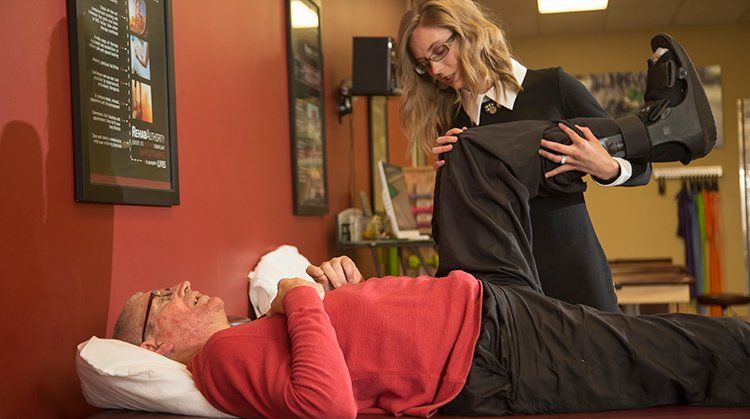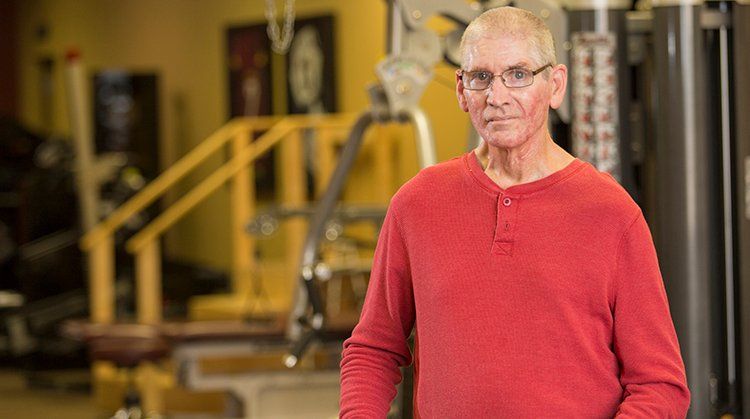Patient Story Medicare Treatment Cap Results in More Pain Choose PT
Medicare Treatment Cap Results in More Discomfort
Nate Anderson's pain medicine will get automatically pumped into his entire body a bit at a period every day.
The medications are solid—a variety of morphine (an opioid discomfort reliever) and baclofen (a muscle tissue relaxer)—but so is Nate's discomfort.
"I'm most likely not the worst situation scenario," Nate claims, "but I'm probably inside the very best 10% of people who’ve had to utilize some pretty nasty narcotics to just manage on a day-to-day schedule."
In 2012, Nate was in a vehicle accident that wounded his throat. In 2016 he previously fusion surgical treatment to fortify his backbone with 2 steel rods and 14 screws.
The medication pump "will take the edge from the most severe of the discomfort," Nate says, but also for additional comfort he depends on treatment from a actual therapist.
Or at the very least he utilized to.
In September 2017, a bit more than a year taken off his fusion surgical procedure, Nate stopped getting direct physical therapist therapy. Not really because he didn't want to buy. Not since it wasn't helping. Instead, because Medicare imposes an yearly cap on rehabilitation solutions that go beyond $1,980, and Nate has already reached that threshold, that could impact his capability to receive additional treatment.
"It's similar to telling someone they can't visit the grocery store and purchase any more groceries since they currently spent their allotted amount of cash," Nate states. "Also to me that's really unfair."
The Medicare treatment cap was applied in 1997. In the last 2 years, Congress has acted 16 periods to create quick-repair "exceptions" in order that medically necessary treatment can be supplied above the cap, however the workarounds are usually disruptive and cumbersome, and folks like Nate could have their treatment interrupted, as well as not have the care they want.
"It's likely to cause me more pain and panic and depression," says Nate, that had to stop his doggie time care business following the car accident because of pain and limited flexibility. "I could do my (bodily therapist-prescribed home workout program), and that's fine and great, but you still have to have support and folks around you."
Nate says that going to his actual physical therapist, Stephanie Weyrauch, PT, DPT, near his house in Thief River Drops, Minnesota, benefits a lot more than simply his physical wellness. It improves his psychological and mental health, as well.
"It offers you hope and travel to not only make your self better, but showing others that you're not only sitting back rather than trying," Nate claims.

Seated back has never already been Nate's design.
He very first received physical treatment at age 2 to handle the consequences of cerebral palsy, which resulted in partial paralysis. Now 56, Nate has significantly less than 50% usage of the left aspect of his entire body, and he's certain his mobility will be much worse or even for a long time of physical therapist therapy, both before and after his car crash.
"I’ve succeeded in lots of things that I shouldn't have already been able to do due to physical therapy," Nate says. "EASILY hadn't had therapy, I’d have been around in a wheelchair rather than gotten out of 1."
When Nate was a kid, his father worked 2 careers—as a college professor and reducing trees for a logging business—to cover up Nate's "astronomical" medical expenses. Now Public Security Disability Insurance policy provides Nate with Medicare, however the therapy cap limitations the type of care he is able to receive. And Nate discovers that troubling, even harmful.
"I'm not just a person that really wants to go on narcotics," Nate says. "Initially I even used alcoholic beverages as a way of (managing discomfort and major depression), and that's wii thing either. We’ve alcoholics inside our family, and for that reason of it I'm the recovering one myself."
What Nate desires would be to continue his actual treatment, which improves his flexibility while assisting him manage his discomfort, anxiety, and despression symptoms. He shudders to think about what his life will be like minus the physical therapist therapy he's received.
"I don't understand where I'd end up being; I don't wish to know," Nate says. "I'm almost sure that I would not end up being here today."
Nate is posting his tale because by the finish of 2017, Congress must again do something on the problematic Medicare treatment cap. Legislation to repeal the cap offers bipartisan assistance, but that doesn't ensure it is a sure factor; in 2015, treatment cap repeal legislation emerged upward just 2 votes brief in the Senate.
While Congress provides repeatedly taken short-term activity to lessen the negative influence, the arbitrary cap on rehabilitation providers continues to be, and Nate could possibly be among its victims—a label that doesn't fit him.
"Many people possess commended me for what I've been in comparison to what We could have already been," Nate states. "They inform me I've inspired them to accomplish more themselves."
Nate has motivated others through his energetic quest for better health through bodily therapy, instead of passive intake of prescription medications to mask the discomfort.
To keep his journey of assisting himself, Nate today needs assist from Congress.
